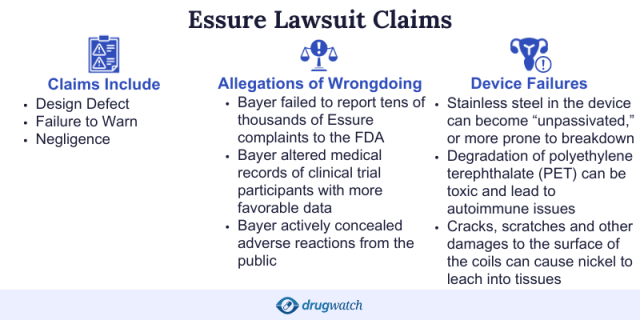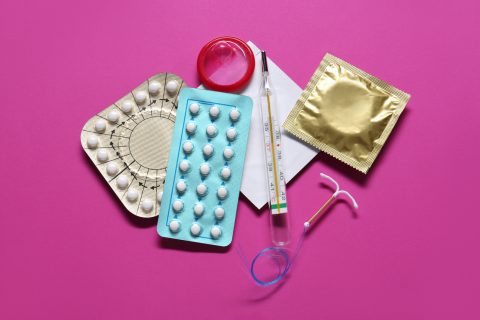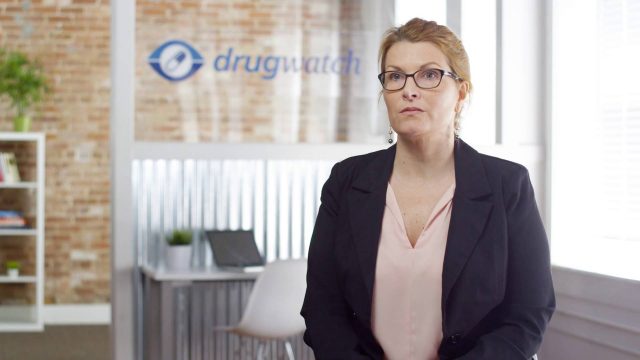Essure Lawsuits
In August 2020, Bayer announced it would pay $1.6 billion to end most of the U.S. Essure lawsuits involving women who claimed the birth control device caused serious health complications. Bayer had stopped selling Essure in 2018 but did not recall the device. Drugwatch’s legal partners are no longer accepting cases.
- Legally reviewed by Julie Lawson Timmer, Esquire
- Last update: June 6, 2025
Latest Essure Lawsuit Updates
As of July 2025, there are no new updates in this litigation. In 2020, Bayer settled the majority of Essure lawsuits, about 39,000 claims, for $1.6 billion. While most of these cases settled in 2020, some women continued to file Essure lawsuits in California and Pennsylvania.
For example, in June 2023, Frankie Baca and several other women sued Bayer in the Eastern District of Pennsylvania under case number 2:23-cv-02280. The judge recently stayed proceedings until February 2025 so the parties could discuss settlement.
Drugwatch’s legal partners are no longer accepting Essure cases.

Why Did People File Essure Lawsuits?
Thousands of American women filed lawsuits against Bayer after they say Essure caused devastating side effects and ruined their lives. Lawsuits said Bayer, and its predecessor Conceptus, failed to report serious side effects such as perforated organs and broken devices to the U.S. Food and Drug Administration and to the public. Conceptus developed Essure before Bayer acquired the company in 2013.
For many women, Essure side effects started immediately after implantation. In lawsuits, some say their devices moved out of the fallopian tubes and cut into nearby organs. Others say their device broke into pieces and wreaked havoc on their bodies.
“Women [rightfully sued] Bayer for the pain and suffering caused by the Essure device. Jobs and marriages have been lost and lives ruined due to injuries caused by this horrific device, which should have already been removed from the market in this country.”
After women in the Essure Problems group met with the FDA and the agency placed sale restrictions and black box warnings on the device, Bayer announced in July 2018 that it would stop selling it by Dec. 31, 2018 in the U.S. The company cited a decline in sales as the reason for the device’s discontinuation.
Nearly two years after Bayer stopped selling the device in the U.S., the company agreed to pay $1.6 billion to end all U.S. Essure claims. In its Aug. 20, 2020, announcement, the company denied any wrongdoing or liability.
“These U.S. settlements have no impact on pending litigation in other countries, as Bayer’s decision to resolve these cases is based significantly upon factors that are specific to the U.S. legal system,” Bayer said.
What Essure Injuries Did Women Claim?
Injuries claimed by women in lawsuits range from severe pain to crippling autoimmune conditions. Several women claimed they had to get hysterectomies because of complications. Even after multiple surgeries, many women still live with chronic pain and inflammation from metal fragments of Essure left in their bodies.
- Depression/anxiety
- Device migration
- Fatigue
- Fragments in patients
- Hair loss
- Headache
- Hypersensitivity/rash
- Menstrual irregularities
- Organ perforation
- Pain
- Weight fluctuations
The FDA approved Essure in 2002, and from 2002 to January 2018 the agency received 26,272 adverse event reports about the device, former FDA and CEO of Device Events analyst Madris Tomes (now Kinard) told Drugwatch when Essure lawsuits first started pouring in.
On April 9, 2018, the FDA issued an order restricting the sale and distribution of Essure “to ensure that all women considering use of the permanent contraception devise are provided with adequate risk information so that they can make informed decisions.” The FDA issued the order “after becoming aware that some women were not being adequately informed of Essure’s risks before getting the device implanted… .”
The number of reports has grown since then. From 2002 to 2023 the FDA received 72,875 medical device reports, according to its April 2024 report. In 2023, 76% of all reports cited litigation.
“The device migrates from the [fallopian] tubes, perforates organs, breaks into pieces and/or corrodes, wreaking havoc on the female body.”
Women in the Pennsylvania lawsuits said Essure “migrates from the [fallopian] tubes, perforates organs, breaks into pieces, and/or corrodes wreaking havoc on the female body.” Manufacturing defects could cause the device to crack, injuring surrounding tissues and organs, according to one complaint. Plastic fibers and nickel in the device could also lead to autoimmune problems.
According to doctors, injuries have discouraged new patients from receiving the device.
“You put in [an internet search for] Essure, and the first thing that comes up is lawsuits,” Dr. James Greenberg, an OB/GYN at Brigham-Faulkner OB/GYN Associates in Boston, told Modern Healthcare. “That’s not something that makes you super excited to have that done to you.”
Allegations Against Bayer and Conceptus
Lawsuits claim that, instead of working as intended, the device “migrates from the [fallopian] tubes, perforates organs, breaks into pieces, and/or corrodes.” These defects led to severe and permanent injuries. The lawsuits are against Conceptus, the original manufacturer of the device, and Bayer, which bought the company in 2013.
Complaints allege several counts of negligence including failing to warn about the risk of side effects. These counts include negligent training, negligent risk management and express breach of warranty.
- Negligent Training
- Lawsuits say Bayer failed to properly train doctors on how to implant the device. It used “Essure Simulator Training” in lieu of actual hands-on training and did not verify doctors completed training before allowing them to implant devices. It also encouraged unqualified doctors to purchase two device kits per month and “sell” Essure to their patients.
- Negligent Risk Management
- Bayer failed to notify the FDA of adverse events and failed to consider these injury reports in continuing to market the device. They received federal citations for failing to disclose adverse events, including pregnancies, perforations and migrations. Specifically, Bayer failed to disclose 16,047 medical device complaints of suspected device malfunction.
- Express Breach of Warranty
- Bayer falsely made statements about Essure’s effectiveness and safety in its marketing materials and its website.
Plaintiffs Who Sued Bayer
Lawsuits say Bayer didn’t report, document or follow up on complications from Essure. The company also failed to warn the public about the problems associated with the device. The device “migrates from the tubes, perforates organs, breaks into pieces and/or corrodes, wreaking havoc on the female body,” according to Amy Harrel’s lawsuit.
Some women lost marriages, family and even died after complications, according to women who spoke to Drugwatch.
For many women, the Essure experience has been long and arduous. They incurred medical bills, scheduled multiple surgeries and suffered poor health for years before they filed lawsuits. The claims of Bradley Baily on behalf of his wife, Stephanie, and Amy N. Harrel are two examples out of thousands of women who filed lawsuits.
Case Examples
Overview
Stephanie Bailey’s husband, Bradley, filed a lawsuit on her behalf in 2016 in the Eastern District Court of Pennsylvania.
Essure Use
Stephanie Bailey received Essure in November 2010.
Injuries Claimed
She suffered numbness in her extremities, long-lasting migraines, joint pain and severe pelvic pain. She had to have a hysterectomy to remove Essure and subsequently died.
Relief Sought
Her husband is seeking damages for loss of love, comfort, care, companionship, affection as well as emergency care, funeral expenses and medical bills.
Overview
Amy Harrel filed her lawsuit in 2020 in the Eastern District Court of Pennsylvania.
Essure Use
Harrel received Essure in 2011.
Injuries Claimed
Dyspareunia, severe and persistent pelvic and back pain, infections, adhesions, loss of cervix, loss of fallopian tubes, and other symptoms related to Essure.
Relief Sought
“An amount in excess of $75,000.00 for each count, including compensatory damages, punitive damages, incidental expenses, consequential damages, including pain and suffering which was a foreseeable consequential damage, delayed damages, attorney’s fees and costs of suit in an amount to be determined upon the trial of this matter.”
Bayer's Essure Defense Tactics
Throughout the litigation process, Bayer tried to weed out claims by using a legal defense called federal preemption, a doctrine that holds federal law preempts state law.
Specifically, Bayer claims that because a federal agency — the FDA — approved Essure at the federal level, plaintiffs are preempted from bringing claims under state law that Bayer failed to warn the public of risks.
The issue of preemption made Essure cases more complicated, and some judges dismissed cases under the preemption doctrine. But Alameda Superior Court Judge Winifred Smith in California allowed Essure lawsuits to proceed, finding that the claims were not preempted under federal law.
Other judges dismissed cases for failing to meet court requirements. For example, St. Louis, Missouri-based U.S. District Judge Stephen N. Limbaugh Jr. tossed 92 out of 95 plaintiffs from a federal Essure case in January 2018 for this reason.
Calling this number connects you with a Drugwatch.com representative. We will direct you to one of our trusted legal partners for a free case review.
Drugwatch.com's trusted legal partners support the organization's mission to keep people safe from dangerous drugs and medical devices. For more information, visit our partners page.




